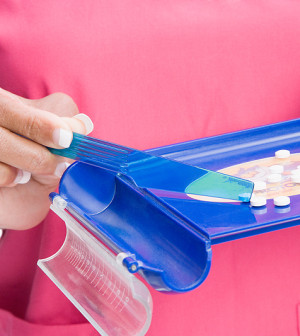- 10 Strategies to Overcome Insomnia
- Could Artificial Sweeteners Be Aging the Brain Faster?
- Techniques for Soothing Your Nervous System
- Does the Water in Your House Smell Funny? Here’s Why
- Can a Daily Dose of Apple Cider Vinegar Actually Aid Weight Loss?
- 6 Health Beverages That Can Actually Spike Your Blood Sugar
- Treatment Options for Social Anxiety Disorder
- Understanding the Connection Between Anxiety and Depression
- How Daily Prunes Can Influence Cholesterol and Inflammation
- When to Take B12 for Better Absorption and Energy
When Antibiotics Are Needed

Overuse of antibiotics is one of the main causes of antibiotic resistance, a major public health threat in the United States.
In an effort to combat the problem, the eighth annual “Get Smart About Antibiotics Week” is being sponsored by the U.S. Centers for Disease Control and Prevention and other partners from Nov. 16-22.
“All use of antibiotics leads, eventually, to resistant bacteria, where those antibiotics just won’t work anymore. And overuse — unnecessary use for viruses or colds — leads to resistance that much faster,” said Dr. Saul Hymes, a specialist in pediatric infectious diseases at Stony Brook Children’s Hospital, in Stony Brook, N.Y.
People must understand that antibiotics cure bacterial infections, not viral infections such as colds or the flu, he said in a hospital news release.
In most cases, symptoms of upper respiratory infections — including sore throats, ear and sinus infections, colds and bronchitis — can be eased by getting plenty of rest; drinking enough fluids; avoiding smoking and secondhand smoke; and taking acetaminophen or ibuprofen to relieve pain or fever.
Soothe a sore throat with ice chips, popsicles, lozenges (only for older children and adults), warm beverages, or by gargling with salt water, Hymes recommended.
A warm compress over the nose and forehead can help relieve sinus pressure. For older children and adults, other options include a decongestant or saline nasal spray, or breathing in steam from the shower or a bowl of hot water.
Over-the-counter medications can help. Consult with your doctor or pharmacist about their use.
If your doctor does prescribe antibiotics, it’s important to take every dose. Never share antibiotics, never use them without a prescription, and never keep extra antibiotics “for the next time,” Hymes said.
You can reduce your family’s chances of needing antibiotics by taking preventive measures such as getting recommended vaccinations, maintaining good hand hygiene and covering your mouth and nose when you cough or sneeze, he added.
More information
The U.S. Centers for Disease Control and Prevention has more about antibiotic resistance.
Source: HealthDay
Copyright © 2026 HealthDay. All rights reserved.










